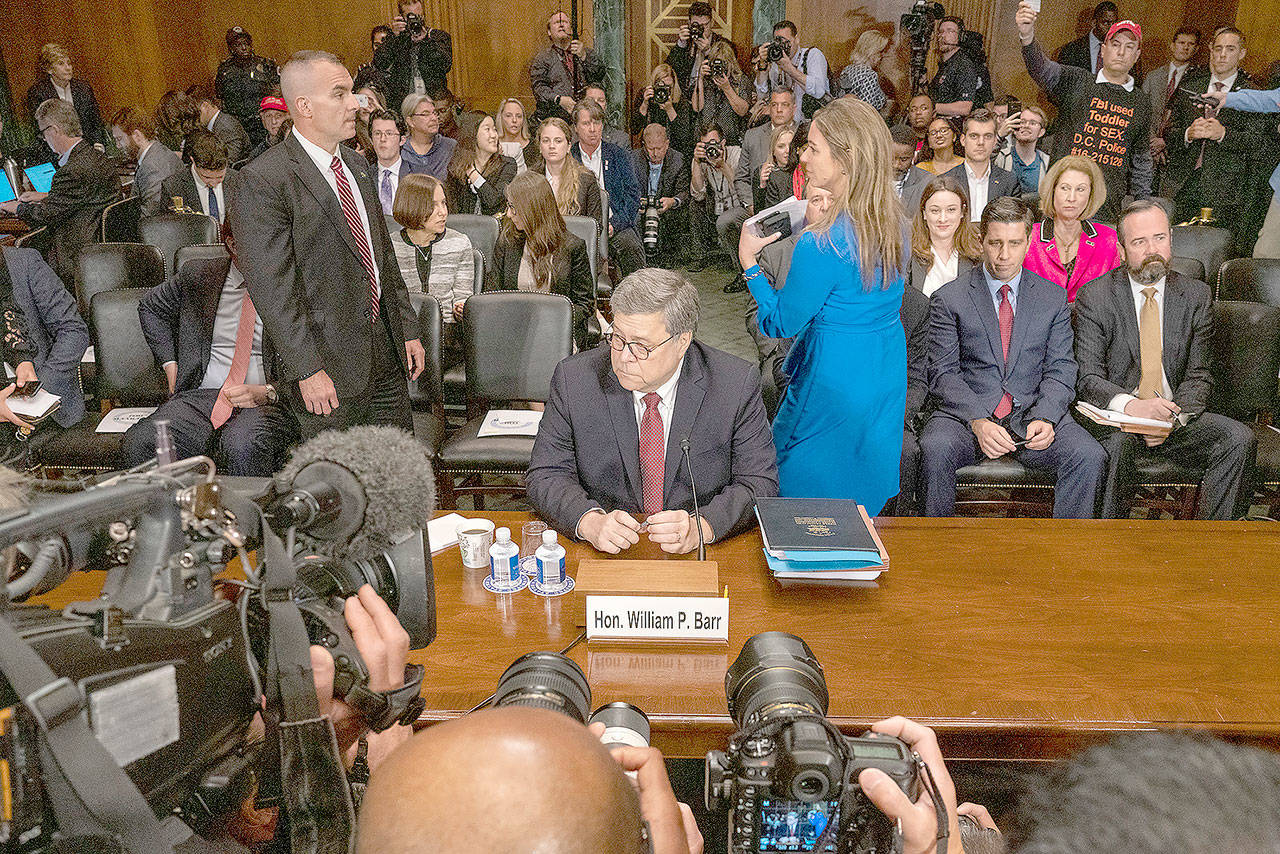By Chris Megerian and Del Quentin Wilber
Los Angeles Times
WASHINGTON, D.C. — Attorney General William Barr ran into a buzzsaw of criticism in Congress on Wednesday for his handling of special counsel Robert S. Mueller III’s report, as Democrats argued he had deliberately mischaracterized Mueller’s findings for partisan purposes.
Testifying for the first time since he released the redacted report two weeks ago, the attorney general repeatedly defended his controversial attempts to summarize the findings to Congress and the public, and pushed back at suggestions that he should resign.
The Senate Judiciary Committee hearing quickly broke down into contentious competing narratives, with Democrats accusing Barr of distorting Mueller’s work, and Republicans pounding the FBI and the Justice Department for alleged problems at the start of the investigation.
Sen. Dianne Feinstein of California, the ranking Democrat on the committee, pressed Barr about his conclusion that President Donald Trump did not obstruct justice during the investigation.
“Contrary to the declarations of the total and complete exoneration, the special counsel’s report contained substantial evidence of misconduct,” she said.
She expressed concern about a letter Mueller sent to Barr on March 27 that said the attorney general’s initial summary of the probe’s findings failed to “fully capture the context, nature and substance of this office’s work and conclusions.”
Sen. Patrick J. Leahy, D-Vt., called Barr’s responses “purposely misleading,” and repeatedly questioned Barr’s claims that Trump had cooperated with the Russia investigation even though he had directed two aides to fire Mueller.
For their part, Republicans focused on whether the FBI had improperly relied on a dossier from a former British spy who cited Russian efforts to help Trump and alleged salacious details about the future president’s conduct.
Sen. John Cornyn, R-Texas, asked whether Barr could state with confidence that the dossier was not part of a Russian disinformation effort.
“I can’t state that with confidence,” Barr said, adding he was looking into whether politics played a role in the genesis of the investigation.
He added that he didn’t think “it was entirely speculative” that Russian operatives purposefully provided false or misleading information to the former British spy, Christopher Steele.
Barr said he also could not “fathom” why the Obama administration didn’t brief the Trump campaign about the Kremlin’s efforts to interfere in the election.
“I don’t understand why the bureau would not have done that,” he said.
South Carolina Republican Sen. Lindsey Graham, the committee chairman, asked whether the investigation was politically motivated from the start, noting that some FBI agents involved had traded private text messages disparaging Trump.
“This committee is going to look long and hard at how all this started,” Graham said.
Barr has said he will review the legal surveillance of a former Trump campaign aide during the 2016 campaign. He defended his description of the court-approved eavesdropping as “spying,” saying it was not meant as a pejorative term.
Barr also is scheduled to appear today before the House Judiciary Committee, which is controlled by Democrats. But he has resisted plans by Rep. Jerrold Nadler, a New York Democrat and the panel’s chair, to have lawyers for each party ask some of the questions.
Some Democrats have already called on the attorney general to resign in the wake of Mueller’s letter to Barr, which was disclosed Tuesday night.
“He misled the American people with his inaccurate summary of Mueller’s report,” tweeted California Democrat Adam B. Schiff, the chair of the House Intelligence Committee. “Then he misled the Congress when he denied knowledge of Mueller’s concerns. How can he be trusted to impartially administer justice?”
Mueller’s letter came in response to a four-page letter that Barr sent to Congress on March 24 that summarized his review of Mueller’s report.
Barr wrote that Mueller had failed to find links between the Trump campaign and Moscow. The attorney general also concluded that the president hadn’t obstructed justice, though he noted that Mueller had failed to exonerate Trump of those allegations.
In addition to complaining that Barr’s letter failed to capture the context of his report, Mueller also wrote that the attorney general’s summary sowed “public confusion about critical aspects of the results of our investigation.” The letter also urged Barr to release the report’s summaries to better help the public understand his rationale and findings.
In a subsequent phone conversation, Mueller told Barr he did not find the attorney general’s letter to be misleading or inaccurate, the attorney general testified on Wednesday.
“He was not suggesting that we had misrepresented his report,” Barr said Wednesday.
Barr said the special counsel felt the media coverage of Barr’s letter had lacked nuance and urged him to release the report’s summaries to provide more context. But Barr said he didn’t want to release the report piecemeal.
“I wanted to get everything out at once,” he said.


